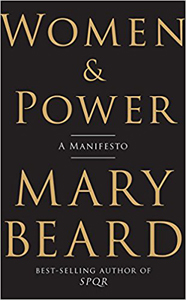 Mary Beard, Women and Power: A Manifesto (New York: Liveright, 2017), 115pp.
Mary Beard, Women and Power: A Manifesto (New York: Liveright, 2017), 115pp.
Mary Beard is a professor of classics at Cambridge University, rebel rock star for her blog "A Don's Life," and a popular television personality in England. I earlier read and reviewed her magisterial and best selling book SPQR; A History of Ancient Rome (2015). This short book originated as two lectures that were given at the British Museum for the London Review of Books (2014, 2017), and later featured on BBC radio and television.
Beard acknowledges that women in the west have much to celebrate. In the 1970s, for example, only about 4% of the UK's MPs were women, whereas about 30% are today. In Rwanda, more than 60% of the legislators are women. But before we get too self-congratulatory, consider that the Saudi Arabian National Council has a greater percentage of women than the Congress of the United States. Beard's manifesto explains "just how deeply embedded in Western culture are the mechanisms that silence women, that refuse to take them seriously, and that sever them from the centers of power."
Her first lecture considers "speech-making" in the broadest sense of the term, whether in a legislature, board room, committee meeting, or office party. Being the classicist that she is, Beard begins with Homer's Odyssey, and moves forward to show how women have been actively and even violently silenced for 3,000 years, or punished if they tried to speak out. Why is it that women are said to "whine," whereas men are said to "make a point?" Public speech, says Beard, has been construed as a "defining attribute of maleness." Our speaking has thus been "gendered."
The second lecture considers power, and begins with a 1915 novella by the American feminist Charlotte Perkins Gilman called Herland, which is a fantasy about a nation of only women. As with speech, Beard argues that "our mental, cultural template for a powerful person remains resolutely male." Women are placed and seen as outside of power. There's an explicit "exteriority" here. Whereas a man might "attain" power, a woman is said to knock the door down, storm the citadel, or smash the glass ceiling. For men power is an expected privilege, for women it's a "power grab." We need to "resituate women on the inside of power," says Beard.
Beard's dozens of examples include not just the classics of Greek and Roman antiquity, Shakespeare and Picasso, but all sorts of references to the popular culture of television, sports, religion, politics (Clinton, May, Merkel, Thatcher), and, based upon her many personal experiences, even internet trolls. The book is better on diagnosis than remedy, but in my view, most any book by Mary Beard is an automatic read. The New York Times called Beard "a Cambridge professor and television lecturer of irresistible salty charm."


